
Samba is a name or prefix used for several rhythmic variants, such as samba urbano carioca, samba de roda, recognized as part of the Intangible Cultural Heritage of Humanity by UNESCO, amongst many other forms of samba, mostly originated in the Rio de Janeiro and Bahia states.
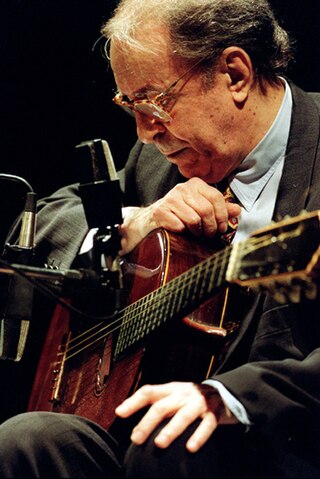
João Gilberto was a Brazilian guitarist, singer, and composer who was a pioneer of the musical genre of bossa nova in the late 1950s. Around the world, he was often called the "father of bossa nova"; in his native Brazil, he was referred to as "O Mito" . In 1965, the album Getz/Gilberto was the first jazz record to win the Grammy Award for Album of the Year. It also won Best Jazz Instrumental Album – Individual or Group and Best Engineered Album, Non-Classical. Nominated at the Grammy 1978 in the category Best Jazz Vocal Performance, album Amoroso, and winner category in Grammy 2001 with João voz e violão Best World Music Album.
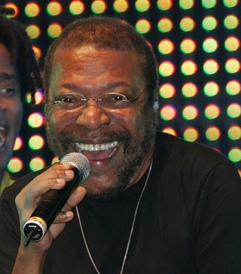
Martinho da Vila is a Brazilian singer and composer who is considered to be one of the main representatives of samba and MPB. He is a prolific songwriter, with hundreds of recorded songs across over 40 solo albums. He also has many songs that were recorded by singers from different musical genres.

Luiz Floriano Bonfá was a Brazilian guitarist and composer. He was best known for the music he composed for the film Black Orpheus.

Tijuca is a neighbourhood of the Northern Zone of the city of Rio de Janeiro, Brazil. It comprises the region of Saens Peña and Afonso Pena squares. According to the 2000 Census, the district has close to 150,000 inhabitants. It borders with Praça da Bandeira, Maracanã, Vila Isabel, Andaraí, Grajaú and Alto da Boa Vista neighbourhoods.

Paulinho da Viola is a Brazilian sambista, singer-songwriter, guitar, cavaquinho and mandolin player, known for his sophisticated harmonies and soft, gentle singing voice.
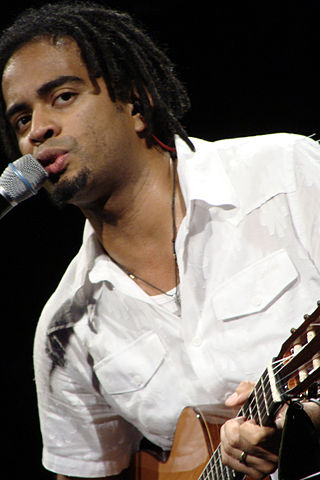
Jair Rodrigues M. Oliveira is a Brazilian composer, singer and producer. He is the son of the late Brazilian musician Jair Rodrigues and brother to singer Luciana Mello.

Lapa is a neighborhood in the city of Rio de Janeiro, in Brazil. It is located in the centre of Rio and is famous for its historical monuments and nightlife.

The reco-reco is a scraper of African origin used as a percussion instrument in Brazilian music, but also in many Latin American countries, where it is known as güiro, güira, guayo and guacharaca.
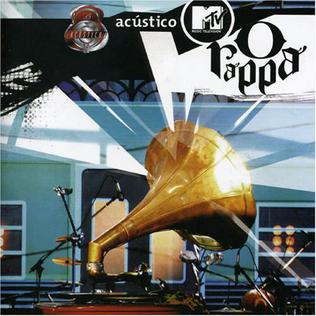
Acústico MTV is the sixth album by Brazilian band O Rappa and their second live album. It was produced by Carlos Eduardo Miranda. It is distributed through Warner Music. It was recorded in May 2005 in São Paulo. The crowd was made up of only friends of the band and members of the official fan club.
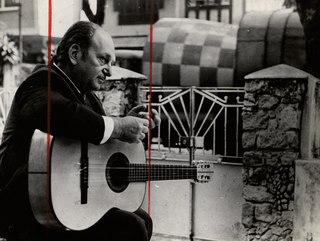
Herivelto de Oliveira Martins was a Brazilian composer, singer, and musician.

Grêmio Recreativo Escola de Samba Unidos de Vila Isabel is a samba school in Rio de Janeiro. It was thrice champion of the Special Group and is currently headquartered in Boulevard 28 de Setembro in Vila Isabel.

Alfredo José da Silva, popularly known as Johnny Alf, was a Brazilian musician, sometimes known as the "Father of Bossa Nova".

Vila Isabel is a middle-class neighborhood in the North Zone of Rio de Janeiro, Brazil. Known for being one of the cradles of samba in Brazil, it is located in the subprefecture of Grande Tijuca, its music-themed Boulevard 28 de Setembro celebrates the neighborhood's long musical heritage. The neighborhood was named in honor of Brazilian Princess Isabel, renowned for abolishing slavery in Brazil. It is home to Unidos de Vila Isabel, one of the most traditional samba schools in Rio de Janeiro.
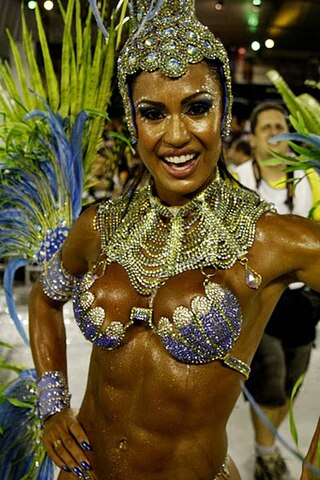
Gracyanne Jacobina Barbosa Vieira is a Brazilian fitness model and Carnaval dancer.

Andrea de Andrade is a Brazilian Carnival Queen. She began performing in samba parades in 2006 with Mocidade, a samba school in Rio de Janeiro. In 2010 she won the "Rainha da bateria" of Mocidade and in 2011 led the parade of this school at the Rio de Janeiro carnival.

The Goldberg Variations is a double CD album by pianist Uri Caine's Ensemble performing Johann Sebastian Bach's Goldberg Variations recorded in remembrance of 250th anniversary of his death and released on the Winter & Winter label.

David Antônio Corrêa was a Brazilian singer-songwriter of the genres samba, samba-enredo and pagode.
Aníbal Augusto Sardinha, known by his professional name, Garoto, was a Brazilian composer and performer on an array of plucked string instruments including the guitar, tenor guitar, 7-string guitar, banjo, cavaco, cavaquinho, and the bandolim. He was also a singer in several of the ensembles in which he performed. An important performer and composer of Brazilian choro, his compositions, influenced by American jazz, anticipated the development of bossa nova. Garoto performed and collaborated with many important musicians, including guitarists Paraguassú, Aimoré, Serelepe, Armando Neves (Armandinho) and Laurindo Almeida, as well as Carmen Miranda and Radamés Gnattali. He also recorded on several labels, including Parlophone (Brazil), Odeon, Continental, and RCA-Victor, and performed on the radio for Rádio Educadora Paulista, Rádio Cosmos, Rádio Cruzeiro do Sul, Rádio Record, Rádio Mayrink Veiga, Rádio Tupi, and Rádio Nacional.
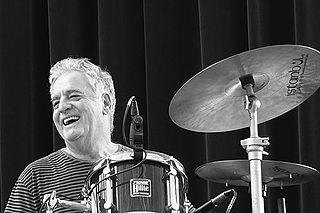
Paulo Braga or Paulinho Braga is a Brazilian drummer and composer. He is considered an innovator in modern Brazilian drumming and one of Brazil's leading drummers, said by some to be the "father of modern Brazilian drums". He is best known for his long period playing with the "founder of bossa nova", Tom Jobim. Braga is said to have recorded more than 900 music tracks.



















